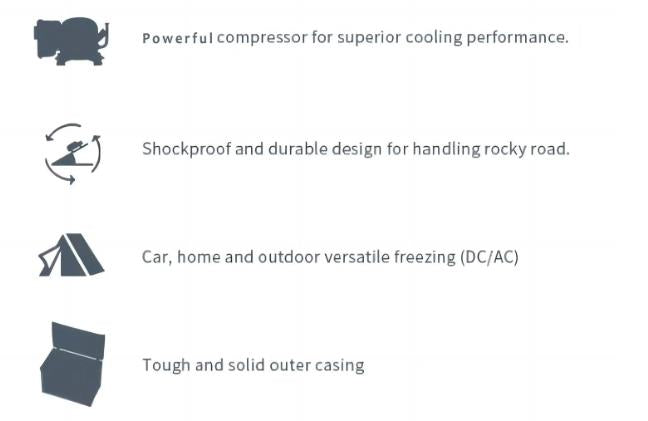Boating enthusiasts often enjoy the thrill of being out on the open water, whether it's for a day trip or an extended voyage. One essential consideration for any boating adventure is ensuring that you have access to fresh and frozen foods. Many boat owners turn to portable freezers to keep their provisions chilled or frozen while they're out at sea. But how do these portable freezers stand up to the challenging conditions of salt air on a boat? In this article, we'll explore the factors to consider when using a portable freezer in a marine environment.
The Benefits of a Portable Freezer on a Boat
Extended Trips Made Easier
For boaters embarking on extended journeys, having a portable freezer cooler on board can be a game-changer. It allows you to stock up on perishable items, reducing the need for frequent resupply stops during your trip.
Fresh Catch Preservation
If you're an avid angler, a portable fridge ensures that you can preserve your catch immediately. Keeping fish and other seafood at freezing temperatures maintains their quality and flavor until you're ready to prepare a delicious meal.
Convenient Storage
A portable fridge freezer maximizes your boat's storage space, as it can be strategically placed to make the most of available room. It's a versatile solution for keeping drinks, ice cream, and other essentials cool.
Convenience and Comfort
Having a portable freezer on your boat adds a level of convenience and comfort. You can enjoy cold beverages, keep snacks frozen, and even prepare meals without worrying about the availability of ice or the quality of your provisions.

Types of Portable Freezers
Compressor-Based Portable Freezers
Compressor-based portable freezers are known for their excellent cooling capabilities. They can maintain low temperatures even in hot and humid conditions. These freezers are a solid choice for boats, but they may consume more power.

The Challenge of Salt Air
Corrosion and Rust
Salt air is notorious for its corrosive effects on metal surfaces. On a boat, where many components are exposed to the sea breeze, corrosion and rust can be a significant concern. Portable freezers, especially those with metal components, can be vulnerable to these effects.
Proper Placement
To minimize the impact of salt air, it's crucial to place your portable fridge freezer in a well-ventilated area on your boat. Avoid positioning it in direct contact with sea spray or where it's constantly exposed to salt-laden winds.
Learn more: Does a Portable Fridge Need Ventilation?
Protective Measures
Consider using protective coatings or covers on metal parts of your portable fridge freezer. These coatings can provide a barrier against salt air and help prolong the life of your freezer.
Power Source
Boat owners must consider the power source for their portable freezer. Some units can run on a boat's electrical system, while others may require a separate power source. Ensure your boat's electrical system can support the freezer's power requirements.

Maintenance and Care
Regular Cleaning
To prevent corrosion and ensure longevity, clean your portable freezer regularly, especially if it's exposed to salt air. Use fresh water to rinse off any salt residue and keep the unit dry when not in use.
Secure Placement
Securely fasten your portable freezer to prevent it from shifting during rough seas. Proper placement and securing prevent damage to both the freezer and the boat.
Lubrication
Apply lubricants to metal components to prevent rust and ensure smooth operation. Check and maintain gaskets and seals to keep your freezer airtight.
Learn more: How to Maintain and Clean a Portable Refrigerator?
Conclusion
In conclusion, a portable freezer cooler can be an invaluable addition to your boat, enhancing your boating experience by providing access to fresh and frozen foods. However, while salt air poses challenges in terms of corrosion, proper placement, protective measures, and regular maintenance can help your portable freezer stand up to the rigors of the sea. Whether you're a dedicated fisherman or simply enjoy extended boat trips, a well-maintained portable freezer will ensure your provisions remain fresh, and your cold treats stay icy. Enjoy your time on the water with the convenience of a portable freezer.
FAQs
Q1: Will a portable freezer work in extremely humid conditions on a boat?
A: Compressor-based portable freezers are better suited for humid conditions, as they can maintain low temperatures more effectively.
Q2: Can I leave my portable freezer on my boat when not in use?
A: It's recommended to remove the portable fridge freezer from the boat when not in use to protect it from salt air and extreme weather conditions.
Q3: Can I use a portable freezer to store fish catches for an extended period?
A: Yes, a portable freezer can safely store fish catches for an extended period, as long as it maintains the necessary low temperatures.
Q4: How can I prevent salt air from damaging the metal components of my portable freezer?
A: Applying protective coatings or covers to metal parts and regular cleaning and lubrication can help prevent salt air damage.







